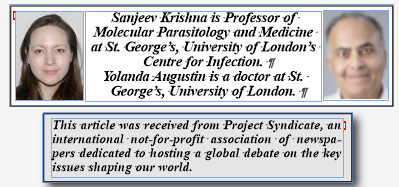By Sanjeev Krishna and Yolanda Augustin
LONDON – Many rich countries have at times failed to provide enough personal protective equipment (PPE) for their health-care workers during the coronavirus pandemic. But the performance of the United Kingdom’s government – which has repeatedly urged the public to “Clap for Our Carers” – has been particularly shameful.
Although the government’s vaccination drive now dominates the headlines, we must not lose sight of the fact that at least 850 health- and social-care workers in England died from COVID-19 between March and December 2020. And these workers remain at risk.
The medical professionals who lost their lives include Peter Tun, a senior doctor managing COVID-19 patients at the Royal Berkshire Hospital in Reading, who pleaded for vital PPE supplies three weeks before he died from the disease last April. Similarly, Andrew Ekene Nwankwo, a locum nurse at Broomfield Hospital in Chelmsford, died of COVID-19 after desperately trying to buy his own PPE online. How many other UK health-care workers would still be alive had the right equipment been available?
The UK has so far recorded more than 4.2 million COVID-19 cases and over 125,000 deaths. The exact number of infections among patient-facing health workers is not known. But one study estimated that they accounted for around 10% of all cases between April and June 2020, with health-care workers being six times more likely to become infected than the general population.
A separate study in late April 2020 found that health-care workers in Birmingham had a rate of seroprevalence – the presence of antibodies to the SARS-CoV-2 virus that causes COVID-19, indicating previous infection – that was four times higher than the local population as a whole (24% versus 6%). These figures do not include the first peak of the pandemic in the UK in late March and early April.
At the end of March 2020, one in four National Health Service doctors were sick or in isolation, according to the Royal College of Physicians. With the NHS facing a PPE supply crisis, the British Medical Association (BMA) reported that some doctors and nurses – like Nwankwo – were buying their own face masks in order to come to work.
Intensive-care staff were better provisioned with scarce PPE, including filtering face piece class 3 (FFP3) respirators. Despite managing the sickest COVID-19 patients, they had lower infection rates than ward-based health-care workers. In contrast, Public Health England recommended that staff in other clinical areas wear more basic fluid-resistant surgical masks unless they were conducting “aerosol-generating procedures.”
Because coughing, a defining COVID-19 symptom, obviously generates aerosols, all staff caring for these patients were at risk of infection. In the Birmingham study, clinicians working in acute care had more than twice the seroprevalence rate of intensive-care staff (33% versus 15%).
Black, Asian, and minority ethnic (BAME) health-care workers have been in even greater peril: they are twice as likely as their white colleagues to become infected with COVID-19, and are at greater risk of developing severe complications and dying.
Yet, even after one year of the pandemic and tens of thousands of health-care worker infections, the UK’s PPE provisioning remains inadequate. Meanwhile, many scientists and doctors fear that the government’s decision to delay giving health-care workers a second COVID-19 vaccine dose may affect vaccine efficacy. Frontline medical staff are thus still at unnecessary risk of infection and death.
Groups representing health-care workers have repeatedly urged the government to address the PPE shortage. In December 2020, Doctors Association UK, a union representing frontline medical staff, called for a public inquiry into COVID-related deaths among NHS workers linked to a lack of PPE. And after a third pandemic wave driven by a new, more transmissible coronavirus variant overwhelmed the NHS at the beginning of January 2021, the BMA and the Royal College of Nursing renewed calls for Public Health England to update its PPE guidance.
BMA Council Chair Chaand Nagpaul has also highlighted that PPE remains a problem for female doctors, because the equipment is designed for men. Women account for 75% of the NHS workforce, and some are often left with pressure sores after long shifts wearing ill-fitting masks.
The AGP Alliance, a coalition of health-care organizations, urged the government to expand the list of aerosol-generating procedures to include the fitting of nasogastric tubes, chest physiotherapy, cardiopulmonary resuscitation, and other procedures. The group called for all relevant health-care workers to be issued FFP3 respirators, face shields, and fluid-repellent gowns.
But in mid-January this year, Public Health England and the UK’s Department of Health and Social Care said there were no plans to change current PPE guidance, and they still have not announced any plans to amend this guidance.
Some NHS Trusts have taken matters into their own hands and given FFP3 masks to all workers caring for confirmed or suspected COVID-19 patients. But protecting the UK’s essential medical staff should not be a matter of drawing straws. The disjointed state of affairs has fueled concerns that exposed health-care workers may be causing COVID-19 to “re-seed” in communities, particularly with a new and more infectious variant.
Cronyism in pandemic-related state procurement (which has given rise to the term “coronyism’) could well be to blame. The government has allocated more than half of its £18 billion ($25 billion) in PPE contracts to date without a competitive tender. Because Public Health England had only two weeks of PPE stocks when the pandemic first hit the UK, it was forced to panic-buy supplies at inflated prices. Moreover, a significant proportion of the equipment paid for was never delivered, and some supplies were not fit for purpose.
COVID-19 infections and deaths in the UK are now falling, largely as a result of the government’s rapid vaccine rollout. But its incompetence regarding PPE means that those battling on the frontline remain in the pandemic’s crosshairs.
Copyright: Project Syndicate, 2021.

